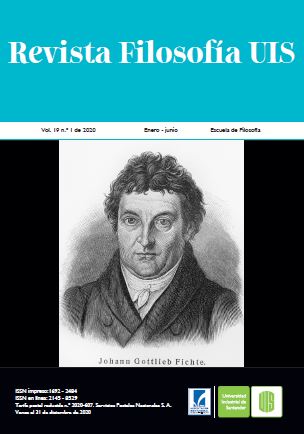The scientific method and philosophy as tools for knowledge generation
Published 2020-01-01
Keywords
- science,
- method,
- paradigm,
- knowledge,
- truth
How to Cite
Copyright (c) 2020 Revista Filosofía UIS

This work is licensed under a Creative Commons Attribution 4.0 International License.
Abstract
Since immemorial times, the man has questioned the world around him and the reasons of the phenomena he observes in nature daily. He has also interested in studying human behavior and explaining human interactions. In the search of explaining what is around him, the man has proposed hypotheses that with the pass of time have been verified or distorted; that body of knowledge which have been able to be confirmed or refuted is what is known as science and the group of stages that are followed to confirm knowledge is what is known as scientific method. This article is aimed to make an analysis of the different definitions of science that have come from thinkers and philosophers along the history and also provides an analysis of the categorization of scientific methods that are applied for the generation of knowledge and how philosophy contributes to its generation.
Downloads
References
Asensi, V. y Parra. A. (2002). El método científico y la nueva filosofía de la ciencia. Anales de documentación, 5, 9-19.
Bunge, M. (2013). La ciencia, su método y su filosofía. Buenos Aires: Laetoli.
Chávez, G.; Hernández, J.; Chávez, H. y Espinosa, M. (2016). Filosofía de la ciencia de Popper, análisis y reflexiones. Educateconciencia, 11(12), 76-87.
Dávila, G. (2006). El razonamiento inductivo y deductivo dentro del proceso investigativo en ciencias experimentales y sociales. Laurus, 12, 180-205.
Gárnica, E. (2016). La importancia del pensamiento filosófico y científico en la generación de conocimiento. Pensamiento Republicano, (4), 105-114.
Falkenburg, B. (2018). Kant and the scope of the analytic method. Studies in History and Philosophy of Science Part A, 71, 13-23.
Feyerabend, P. (1993). Against Method. London: Third Edition.
Hassan, N. R. & Mingers, J. (2018). Reinterpreting the kuhnian paradigm in information systems. Journal of the Association for Information Systems, 19(7), 568-599.
Herbert, J. D. et al. (2000). Science and pseudoscience in the development of eye movement desensitization and reprocessing: Implications for clinical psychology. Clinical Psychology Review, 20(8), 945-971.
Kankam, P. K. (2019). The use of paradigms in information research. Library & Information Science Research, 41(2), 85-92.
Kant, I. (1998). Critique of Pure Reason. (P. Guyer and A. Wood, trads.). Cambridge: Cambridge University Press.
Kuhn, T. (2002). La estructura de las revoluciones científicas. Buenos Aires: Fondo de Cultura Económica.
Mié, F. (2009). Dialéctica y ciencia en Aristóteles. Revista Signos filosóficos, 11(21), 9-42.
Montuschi, L. (2001). Datos, información y conocimiento. De la sociedad de la información a la sociedad del conocimiento. Serie Documentos de Trabajo de la Universidad del CEMA, 192(6), 2-32.
More, S. J. (2012). Evidence is at the core of scientific method: A challenge for clinicians. The Veterinary Journal, 1(191), 11-12.
Munévar, G. (2016). Historical antecedents to the philosophy of Paul Feyerabend. Studies in History and Philosophy of Science Part A, 57, 9-16.
Popper, K. (1972). Conjeturas y refutaciones. Barcelona: Paidós.
Schwartz, S. A. (2018). Kuhn, Consciousness, and Paradigms. Explore: The Journal of Science and Healing, 14(4), 254-261.
Sale, J. E. & Thielke, S. (2018). Qualitative research is a fundamental scientific process. Journal of clinical epidemiology, 102, 129-133.
Whewell, W. (1840). The philosophy of the inductive sciences: founded upon their history. Volumen 1. London: JW Parker.

